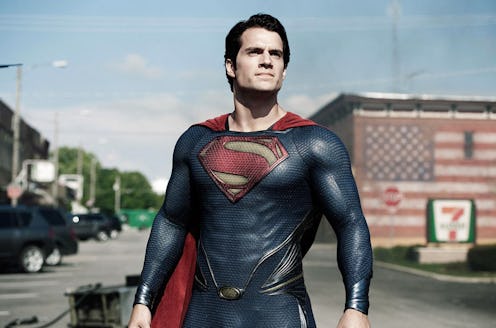Entertainment
Should Superhero Movies be Funny, or Serious?

Well apparently Warner Bros. hates laughter. At least, that's the rumor according to Hitfix's Drew McWeeny, who wrote Tuesday about the possibility that Warner Bros. is instituting a "no jokes" policy on their DC superhero movies. If these rumors turn out to be true, it's probably the key to Warner Bros.' downfall in the battle against Marvel.
The thing about these whisperings is that, as The Mary Sue's Jill Pantozzi points out, they sound like very rumory rumors — but they also sound completely plausible if you've seen a Warner Bros. superhero movie in the past couple of years. Warner Bros.' DC is definitely the "grittier" of the superhero brands these days, reaching back to Christopher Nolan's very well-received Batman movies and exhibiting itself more recently in Man Of Steel. As McWeeny points out, the notable sore thumb in that stretch of Warner Bros.' superhero material is Green Lantern, which was "resolutely unafraid to make jokes" and whose complete critic and audience-panned reception seems like it might be the thing that scared the studio away from humor entirely.
But as Catwoman is not a reason for studios to put an unofficial moratorium on female superhero movies for the decade following it — seriously, it's been a decade — Green Lantern is not a reason to ban jokes from your superhero movies.
If this rumor about Warner Bros. is true — and there's a possibility it isn't, but it just feels true, you know? — this doesn't exactly seem like the studio's finest idea. Ill-advised is the word I'd use to describe it, if not just dumb. Grizzled heroes can be great in moderation (see the aforementioned Nolan Batmans) but one of the major reasons people go to superhero movies to have fun.
Warner Bros. is in the unenviable position of being compared to Marvel at every turn, but that's for good reason. Just look what Marvel did this past year: Captain America: The Winter Soldier was one of the more grizzled Marvel movies, for sure, and it was critically well-received — but they didn't follow it up with something else gritty, they followed it up with Guardians Of the Galaxy. You can have your Serious Heroes, but you've gotta have your levity, too. Time has proven that balance is the name of the game when it comes to this era of superhero saturation and Marvel bought itself some with Guardians, but many are already side-eyeing the preemptively frowny Batman V Superman: Dawn Of Justice.
Laughter can't save everything, though: Andrew Garfield and Emma Stone are genuinely charming and genuinely good at their funny banter in the Amazing Spider-Man movies, but repetition has already tired audiences out with solo Spider-Man movies. But mix levity with emotional (or political!) darkness and you can get Iron Man, you can get the more recent X-Men "prequels," you can get Avengers, you can get Guardians. And an Iron Man 3 can buy you some time for a darker Captain America 2.
What Warner Bros. needs to realize, whether the "no jokes" is an official mandate or just a rumor based in public perception, is that what has brought us into this era of fans embracing superhero movies so thoroughly isn't sad men in Spandex, or tragic backstories of dead relatives. Marvel's brand has often been one that mixes big corporate box office strategy with the visions of "auteur"y filmmakers like Joss Whedon or James Gunn — it's what made Edgar Wright jumping ship from Ant-Man such a big deal, and it's also what got people back on the bandwagon once Guardians premiered. Nolan's version of Batman didn't succeed because Batman was sad and didn't know how to crack a joke, it succeeded because of Christopher Nolan. Similarly, Green Lantern didn't fail because it tried to tell jokes.
The key here, it would seem, would be in writing better jokes in the first place.
Image: Warner Bros.; Marvel